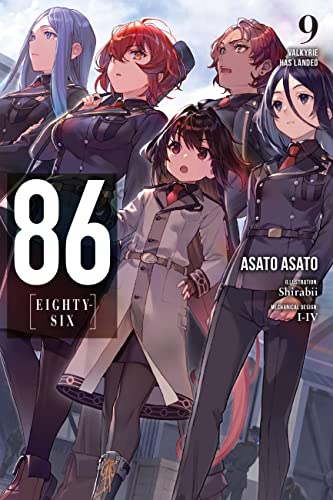By Asato Asato and Shirabii. Released in Japan by Dengeki Bunko. Released in North America by Yen On. Translated by Roman Lempert.
And so we go back to the beginning of the series, and back to the Republic. Honestly, I’m sure many fans would have been perfectly happy to never have to see the republic again. That said, the 86 series is not about giving fans what they want, as the opening epigraph certainly shows. It’s about the horrors of war, what war can do to people as individuals and as a group, and the depths to which people are willing to sink to justify their moral righteousness and cowardice. This book is very well-written, delivering a series of emotional gut-punches. That said, holy Christ, it’s depressing. At the end of this book the entire cast is left wondering what the point of the previous ten books was, and if they’ve really achieved anything whatsoever. It’s a question that I’m asking myself as well. What do I want out of 86? It’s well-written, but is this going to be a “this will go full tragedy and everyone will die” series, or will their be a glimmer of future hope? Signs point to no right now.
The book starts off with bad news right from the get go, as the Legion starts dropping satellites from orbit onto the Federation and its allied countries. Devastation follows, and everyone is forced to retreat from the gains they’d made over the last several books. Oddly, there is one country that did not get bombed from above: the Republic. And now the 86 have perhaps their least appetizing assignment of all: go to the Republic and evacuate everyone. And yes, they’re aware that it’s likely a trap, but what other choice do they have? Needless to say, back in the Republic we are reminded of why we hate the Republic so much, though we also get glimmers of good people just trying their best. Unfortunately, we are also reminded that a lot of Legion soldiers are made up of Former 86. And they REALLY hate the Republic.
The last third of this book should probably have a content warning, as there is mass death and slaughter, with innocents napalmed, butchered, and otherwise murdered in a variety of ways. And this doesn’t even get into the fact that our heroes are there to escort some very reluctant Republican citizens to another country, and grateful is not part of their vocabulary, to the point where Lena has to essentially make herself an even bigger source of hatred to motivate them to not just sit down and die whimpering. By the end of the book, we’re as exhausted as the cast. This is the sort of book where the only thing that will make it feel better is to read the next book in the series. And that’s not out yet in Japan, so expect about a year till we hear from them again.
I don’t want to downplay how this is a very good book. The action is well-written, the emotions are powerful, and the heartbreak is real. It’s just… as with real war, it’s hard not to come out of it wondering why you’re here at all.


